6 Benefits Of Soursop Leaves, How To Use, And Side Effects
The supplement comes from a tree with as many names as its beneficial properties.

Image: Midjourney/ StyleCraze Design Team
The benefits of soursop leaves are gaining the attention of many health enthusiasts and researchers. This Brazilian flowering tree has leaves and fruits known to offer an array of health benefits. These leaves have been used across various cultures in traditional medicine for their healing properties. These leaves are also claimed to be 10,000 times stronger and more effective than chemotherapy (1).
Soursop leaves are rich in nutrients and used as a natural remedy for various ailments. Learn more about these leaves and whether their claimed benefits are real or not from the article below. Keep reading to know more!
 Know Your Ingredient: Soursop Leaves
Know Your Ingredient: Soursop LeavesWhat Is It?
The soursop tree, scientifically known as Annona muricata, is a small evergreen tree.
What Are Its Benefits?
Boosting the immune system, reducing inflammation, promoting healthy digestion and oral health, stabilizing blood pressure, and helping with insomnia.
Who Can Use It?
It is suitable for everyone.
How Often?
Consume once or twice weekly for general health advantages. It is best to seek professional guidance while using it to treat particular health issues.
Caution
May result in neuron dysfunction and drastically lower blood pressure, hence pregnant or breastfeeding persons should avoid it as well as hypotension patients.
In This Article
What Are Soursop Leaves?
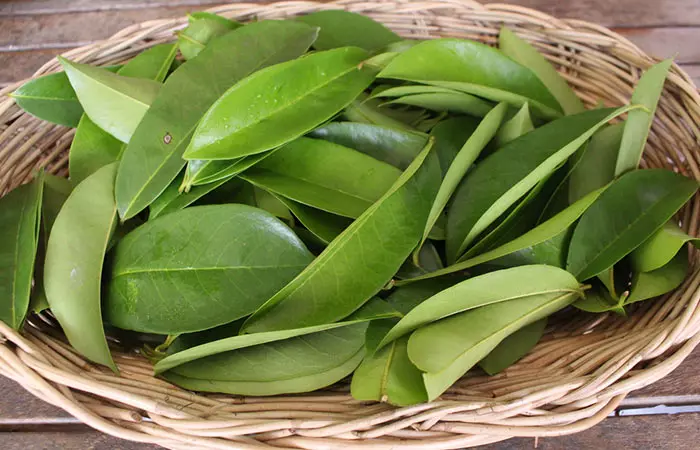
Soursop (Annona muricata), also known as Graviola or Brazilian paw-paw, is a flowering evergreen tree. It is native to Central America, Mexico, Cuba, and parts of India. It is now widely distributed from southeastern China to Australia and Eastern and Western Africa.
Traditional medicine uses soursop leaves for treating several diseases and ailments. This plant is primarily used for treating inflammation, rheumatism, hypertension, diabetes, parasitic infections, and other similar conditions (2).
The soursop fruit is edible and has good therapeutic value. Soursop benefits your overall health in many ways and it is also popular as an anti-arthritic agent. Its extracts fight parasitic and worm infections. The leaves work on treating hypoglycemia and inflammation and also possess antispasmodic properties (2).
These benefits of soursop can be attributed to the plant’s metabolites. Saponins, alkaloids, coumarins, terpenoids, tannins, and several other active phytochemicals have been identified in this miracle plant.
In the following section, we will look at the possible health benefits of soursop leaves.
Key Takeaways
- Soursop leaves have been traditionally used to treat various health conditions.
- The leaves contain compounds that may help reduce the risk of cancer and other chronic diseases.
- Soursop leaves may help regulate blood sugar levels and improve heart health.
- The best way to incorporate this leaf into your routine is to brew tea with them.
- Individuals taking medication to lower blood pressure should avoid it as the leaves may decrease blood pressure way too much.
What Are The Health Benefits Of Soursop Leaves?
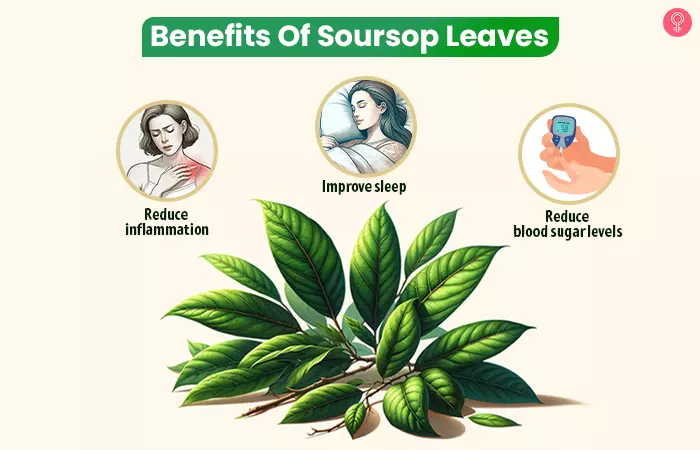
The leaves of the soursop plant are well-known anti-inflammatory agents. They also have antipyretici A medical substance that helps reduce or control fever with headache, cough, runny nose, and sneezing. , antimicrobial, antidiabetic, cardioprotective, and anti-parasitic properties. Soursop extracts can positively affect the vital systems in your body.
1. May Aid Cancer Treatment
Studies demonstrate antiproliferativei A medical substance that suppresses the growth of malignant or cancerous cells into the surrounding tissue. and cytotoxici A process that causes cells to die. It is often used to kill toxic cells in the body to protect it, for example, in the treatment of cancer. effects of the extracts of soursop plant against cancers of the breast, colon, prostate, respiratory organs, blood, liver, cervix, ovary, the mouth, and the skin (3).
A review published in the Malaysian Journal of Medical Sciences highlights the potential of Annona muricata (soursop) in cancer treatment. As cancer rates rise, many patients seek alternatives to conventional treatments like surgery, chemotherapy, and radiotherapy. The study found that extracts from soursop could target cancer cells. The active bio ingredients that may be beneficial are called annonaceous acetogenins (AGEs). These AGEs are involved in the anticancer properties of soursop. They kill cancer cells by inhibiting the mitochondrial complex I, a cancer cell protein (2).
However, more rigorous studies are needed to confirm the safety and effectiveness of soursop and its leaves (3).
2. May Control Inflammation
Studies have identified more than 117 compounds in soursop leaves that have anti-inflammatory properties. More research studies are required to understand the leaves’ anti-inflammatory effects (4).
The leaf extracts of soursop showed anti-inflammatory, antioxidant, and wound-healing properties in rat studies (5).
The decoction of the leaves is applied topically for its anti-rheumatic and neuralgici A tingling short-term sensation or pain along a nerve in the head or neck that is associated with conditions like diabetes. effects. It also reduces/heals abscesses and wounds. The leaf extracts can relieve inflammatory conditions like cystitis, rheumatismi It occurs when the immune system attacks healthy body tissues. Its symptoms include inflammation or pain in joints and muscles. , arthritic pain, fever, diarrhea, dysentery, malaria, parasites, and skin rashes (4).
A review published in the journal Frontiers in Pharmacology explores the potential of Annona muricata (soursop) leaves as a source of anti-inflammatory and anticancer agents. Soursop leaf extract inhibits inflammatory mediators like IL-6, TNF-α, IL-1β, and nitric oxide (NO). A dose of 100 mg/kg of this extract proved to be anti-nociceptive (blocking pain) in rats (4).
The leaves could also heal ulcers, lesions, open wounds, and edema with almost no toxicity in rat studies (4).
3. May Help Treat Insomnia
Traditionally, soursop leaves have been used to treat insomnia (6). The leaves have a smooth muscle relaxant activity and act as sedatives. Taking a glass of soursop leaf tea may also help ease stress (7).
Tia Dee, a vlogger, shared her experience about taking soursop tea to improve her sleep cycles. She said, “My nerves are basically hyperactive, so what soursop does is it helps calm your nerves, and again, anecdotal, but that’s been my experience (i).” She adds that drinking tea in the evenings helps her fall into a deep sleep.
4. May Help Regulate Diabetes Symptoms
Daily administration of 100 mg/kg of aqueous soursop extract to rats exhibited strong glycemic control. The leaves of the plant may help improve glucose metabolism. A study published in the Journal of Ethnopharmacology found that soursop leaf extract could help manage diabetes due to its ability to lower blood sugar levels, improve antioxidant activity, and protect pancreatic β-cells, which play a key role in regulating glucose. The study was done on diabetic rats and the researchers observed that the extract significantly reduced blood sugar, improved lipid profiles, reduced markers of oxidative stress, and supported better liver and kidney function. Long-term use also restored antioxidant enzyme activity and reduced harmful cholesterol levels, showing its potential as a natural treatment for diabetes and its complications (8).
Prolonged soursop treatment (for 28 days) in the rats reduced blood glucose levels and serum creatinine levels. It also balanced the activity of liver enzymes (AST, ALT, etc.). The levels of total cholesterol and triglycerides were also restored (8).
 Trivia
Trivia5. May Possess Antiviral Properties
Soursop extracts show antiviral properties against selective viruses. The plant interferes with the replication of HIV-1 in the host cells. Also, these extracts keep the virus from attaching to the host cell. The bark and stem extracts of soursop were noted to act against herpes simplex virus (HSX) (7).
Though there is no direct research indicating similar effects with the leaves, the results of the aforementioned research may be extrapolated to the leaves as well.
The virucidal effect of the soursop plant could be attributed to its polyphenols (7).
6. May Protect Oral Health
Soursop leaves were found to be bactericidal and fungicidal. They inhibited the growth of Streptococcus mutans, Streptococcus mitis, Porphyromonas gingivalis, and Candida albicans (1).
Studies show that soursop leaf extracts can be used against oral microbes to an extent. The extracts have antimicrobial and fungicidal properties (1).
These strains were found to cause periodontitis, gingivitis, and other oral diseases. Lab experiments report an antimicrobial effect of the leaves. They were most potent against the fungus Candida albicans. These results show the potency of soursop leaves in treating oral disorders (1).
Dr. Kasen Somana, a Digital Cosmetic Dentist, says, “These Annona muricata plants can effectively kill Staphylococcus aureus and cholera strains. You can cure gum diseases, tooth decay, and gingivitis by consuming soursop leaves.”
Soursop leaves have a powerful phytochemical profile. In the following section, we will further look into the nutrients responsible for their benefits.
Phytochemical Composition Of Soursop Leaves
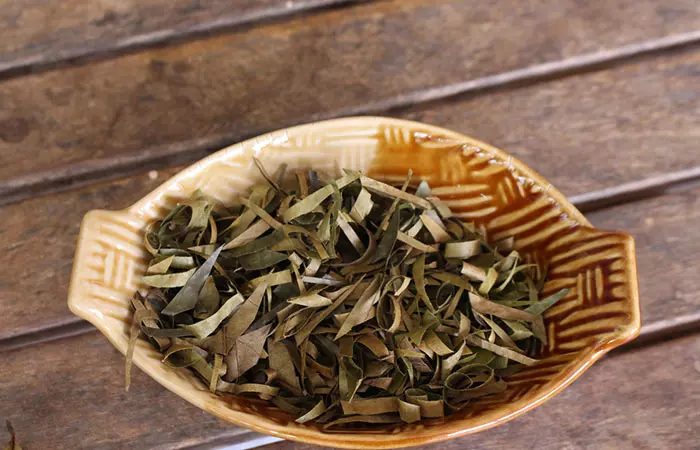
Soursop plants contain several kinds of phytochemicals, including alkaloids, phenolics, and terpenoids. However, a few species of soursop are rich sources of annonaceous acetogenin compounds (AGEs). AGEs are considered crucial for their antimicrobial, antiprotozoal, antiviral, and anthelmintic properties (6).
Annomuricin, annomutacin, annohexocin, muricapentocin, anonaine, isolaureline, xylopine, gallic acid, epicatechin, quercetin, catechin, chlorogenic acid, kaempferol, annonamine, norcorydine, vomifoliol were identified in these leaves (6).
They also contain rutin, blumenol, solamin, epomuricenin, reticuline, coreximine, coclaurine, stepharine, atherosperminine, and anomuricine. The seeds, fruits, roots, and other aerial parts contain these (and a few other) phytochemicals in varying proportions (6).
Soursop leaf oils also contain sesquiterpenes. The most abundant compound is β-caryophyllene. These volatile oils have β-pinene, germacrene-D, α-pinene, β–elemene, δ-cadinene, epi-α-cadinol, and α-cadinol (6).
A cognitive effect of all these phytochemicals results in the benefits discussed above. Here’s how you can use these leaves to reap their benefits.
How To Use Soursop Leaves
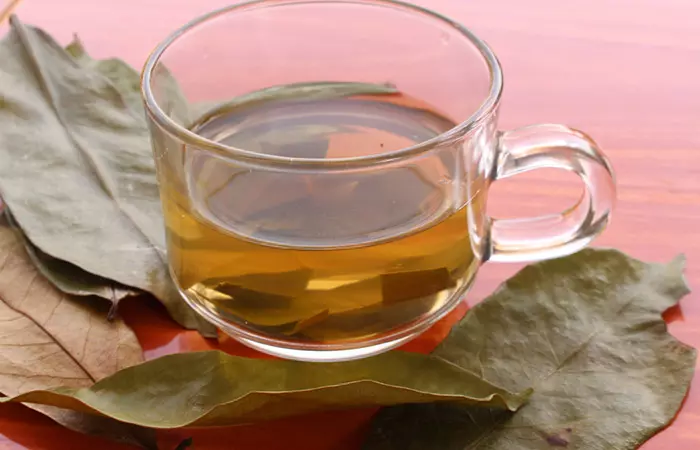
The best way to use these leaves is to brew tea with them. This is because there is no information on how safe it is to ingest raw soursop leaves.
Does that mean you have to brew its tea only in a certain way? Well, not really. You can brew it in two ways:
1. Regular Brew For Flavor
-
- Add 1 to 2 tablespoons of your favorite soursop tea blend to a teapot. You can find a good one here.
- Add boiling water and let it steep for 5-10 minutes.
- Strain the leaves.
- Serve hot/warm or cold.
If you are using whole soursop leaves,
- Use 2-3 soursop leaves for one to two cups of tea.
- Set a pot of boiling water ready.
- Add these leaves to water and let them simmer for at least 10 minutes.
- Strain the leaves before serving.
If you want to skip through these steps, just get the soursop tea bags here. Dip and enjoy!
2. Prolonged Brew For Health
- Set up a boiling pot with 1 liter of cold water.
- Add the whole soursop leaves or the soursop blend.
- Bring the water to a boil.
- Boil it uncovered until the water has been reduced by half.
- Turn off the heat, and let the tea steep for about 20 minutes.
- Drink it hot/warm/at room temperature.
To make it taste better, add about half a teaspoon of lime juice, 2-3 mint leaves, and some honey (if you want it sweet).
Besides tea, you may also add a broth made of soursop leaves to smoothies. Simply blend the broth with any fruit of your choice to enhance your nutrient intake. You may also add it to soups. Learn one such recipe in the next section.
Soursop Leaf Recipe
Soursop Soup
What You Need
- 4 to 6 soursop leaves
- 1 cup diced green peppers
- 2 cups cubed zucchini
- 2 cups cubed summer squash
- 1 cup diced red peppers
- 1 cup quinoa
- 1 cup diced onions
- 2 cups cubed chayote squash
- 3 tablespoons onion powder
- 4 teaspoons sea salt
- 16 cups water (1 gallon)
- 2 cups chopped kale
- 1 tablespoon basil
- 1 tablespoon oregano
- 1 tablespoon minced fresh ginger
- 1/4 teaspoon cayenne
How To Prepare
- Place the leaves in a large stockpot and add 4 cups of water.
- Boil the leaves for 15-20 minutes with the lid on.
- Remove the leaves from the broth.
- Add all the remaining ingredients along with 8 cups of water.
- Stir frequently and let it cook over medium heat for 30 to 45 minutes.
- Serve hot!
 Quick Tip
Quick TipThere is some evidence that soursop leaves may cause adverse effects.
What Are The Side Effects Of Soursop Leaves?

- May Cause Neuron Dysfunction
Soursop and its leaves contain alkaloids. Studies show these may cause neuron dysfunction and degeneration in those with Parkinson’s syndrome (9), (10). Therefore, individuals with existing neurological conditions should always consult a healthcare professional before consuming soursop leaves.
- May Lower Blood Pressure Way Too Much
The plant and its leaves may also lower blood pressure way too much (11). Hence, individuals on blood pressure-lowering medications must exercise caution.
There is no set dose for soursop leaves/tea yet. Neither are there any reports of toxicity. Animal studies showed no signs of toxicity – even at doses as high as 2 g/kg (12).
However, we suggest you talk to your healthcare provider about the dosage.
Infographic: Benefits Of Soursop Leaves
Soursop leaves are known for their medicinal properties. They are believed to have potent anti-cancer properties and are widely used to manage many ailments. Tea made with these leaves contains many nutrients that can improve your overall health.
The following infographic will tell you everything you need to know about the various benefits of soursop leaves. Check it out! Illustration: StyleCraze Design Team

Soursop leaves have been used in traditional medicine for their medicinal properties. A wide variety of nutrients and phytochemicals in soursop leaves benefits your overall health. The leaves exhibit antidiabetic, anti-inflammatory, antimicrobial, and anti-parasitic properties. These leaves may help fight against tumor cells, control inflammation, treat anemia, regulate blood glucose levels, and protect oral health. However, they may cause neuron dysfunction and reduce blood pressure levels way too much in certain individuals. Hence, check with your doctor for their dosage. People on blood-pressure medications must avoid these leaves.
Frequently Asked Questions
Is soursop acidic or alkaline?
Soursop has an acidic pH of about 4.1 to 4.8 (13).
Is soursop good for sperm?
There is insufficient scientific evidence to suggest that soursop has an effect on spermatozoa.
How do you store soursop leaves?
Store soursop leaves in a cool, dry place. If they are packaged, check the label for storage instructions.
Is soursop leaf tea good for nerves?
Possibly not. Soursop contains specific alkaloids that may lead to nervous disorders (14).
Can soursop leaves help with weight loss?
Soursop may prevent body fat accumulation which could lead to weight loss and help those with obesity (15). However, there is limited scientific research available to support the use of soursop leaves for weight loss.
Discover 9 incredible health benefits of soursop leaves and juice. Learn how this amazing fruit can help improve your health and well-being from the video below.
Personal Experience: Source
StyleCraze's articles are interwoven with authentic personal narratives that provide depth and resonance to our content. Below are the sources of the personal accounts referenced in this article.
i. Fibro Friday | My Favorite Tea for Better Sleep | Soursop Tea for Nerves |https://www.youtube.com/watch?v=TfjCsAqtkq4
References
Articles on StyleCraze are backed by verified information from peer-reviewed and academic research papers, reputed organizations, research institutions, and medical associations to ensure accuracy and relevance. Read our editorial policy to learn more.
- Anti-microbial Efficacy of Soursop Leaf Extract (Annona muricata) on Oral Pathogens: An In-vitro Study, Journal of Clinical & Diagnostic Research, US National Library of Medicine, National Institutes of Health.
https://www.ncbi.nlm.nih.gov/pmc/articles/PMC5198446/ - Potential Benefits of Annona muricata in Combating Cancer: A Review, The Malaysian Journal of Medical Sciences, US National Library of Medicine, National Institutes of Health.
https://www.ncbi.nlm.nih.gov/pmc/articles/PMC5862046/ - Anticancer Properties of Graviola (Annona muricata): A Comprehensive Mechanistic Review, Oxidative Medicine and Cellular Longevity, US National Library of Medicine, National Institutes of Health.
https://www.ncbi.nlm.nih.gov/pmc/articles/PMC6091294/ - Exploring the Leaves of Annona muricata L. as a Source of Potential Anti-inflammatory and Anticancer Agents, Frontiers in Pharmacology, US National Library of Medicine, National Institutes of Health.
https://www.ncbi.nlm.nih.gov/pmc/articles/PMC6019487/ - Annona muricata leaves accelerate wound healing in rats via involvement of Hsp70 and antioxidant defence, International Journal of Surgery, US National Library of Medicine, National Institutes of Health.
https://pubmed.ncbi.nlm.nih.gov/25899210/ - Annona muricata (Annonaceae): A Review of Its Traditional Uses, Isolated Acetogenins and Biological Activities, International Journal of Molecular Sciences, US National Library of Medicine, National Institutes of Health.
https://www.ncbi.nlm.nih.gov/pmc/articles/PMC4519917/ - Annona muricata: Is the natural therapy to most disease conditions including cancer growing in our backyard? A systematic review of its research history and future prospects, Asian Pacific Journal of Tropical Medicine, Academia.
https://www.academia.edu/34871086/Annona_muricata_Is_the_natural_therapy_to_most_disease_conditions_including_cancer_growing_in_our_backyard_A_systematic_review_of_its_research_history_and_future_prospects - Antidiabetic and antioxidant effects of Annona muricata (Annonaceae), aqueous extract on streptozotocin-induced diabetic rats, Journal of Ethnopharmacology, US National Library of Medicine, National Institutes of Health.
https://pubmed.ncbi.nlm.nih.gov/24076471/ - Toxicity of Annonaceae for dopaminergic neurons: potential role in atypical parkinsonism in Guadeloupe, Official Journal of the Movement Disorder Society, US National Library of Medicine, National Institutes of Health.
https://pubmed.ncbi.nlm.nih.gov/11835443/ - Is atypical parkinsonism in the Caribbean caused by the consumption of Annonacae?, Journal of Neural Transmission, US National Library of Medicine, National Institutes of Health.
https://pubmed.ncbi.nlm.nih.gov/17017523/ - Possible mechanisms of action of the hypotensive effect of Annona muricata (soursop) in normotensive Sprague-Dawley rats, Pharmaceutical Biology, US National Library of Medicine, National Institutes of Health.
https://pubmed.ncbi.nlm.nih.gov/22950673/ - Gastroprotective activity of Annona muricata leaves against ethanol-induced gastric injury in rats via Hsp70/Bax involvement, Drug Design, Development, and Therapy, US National Library of Medicine, National Institutes of Health.
https://pubmed.ncbi.nlm.nih.gov/25378912/ - Investigation on nutritional potential of soursop (Annona muricata L.) from Benin for its use as food supplement against protein-energy deficiency.
https://www.researchgate.net/figure/Mineral-content-of-soursop-pulp_fig1_270506813 - Pharmacological Activities of Soursop (Annona muricata Lin.)
https://www.ncbi.nlm.nih.gov/pmc/articles/PMC8878098/
Read full bio of Madhu Sharma
- Dr. Kasen Somana, BDS, MSc (Aesthetic Dentistry), is a highly skilled and sought after cosmetic dental surgeon who has as performed over 50,000 dental procedures. He specializes in veneers and has a special interest in conservative, digital fixed prosthodontics, and occlusal rehabilitation. He graduated from the University of Sydney and has been in private practice for over 15 years.
 Dr. Kasen Somana, BDS, MSc (Aesthetic Dentistry), is a highly skilled and sought after cosmetic dental surgeon who has as performed over 50,000 dental procedures. He specializes in veneers and has a special interest in conservative, digital fixed prosthodontics, and occlusal rehabilitation. He graduated from the University of Sydney and has been in private practice for over 15 years.
Dr. Kasen Somana, BDS, MSc (Aesthetic Dentistry), is a highly skilled and sought after cosmetic dental surgeon who has as performed over 50,000 dental procedures. He specializes in veneers and has a special interest in conservative, digital fixed prosthodontics, and occlusal rehabilitation. He graduated from the University of Sydney and has been in private practice for over 15 years.
Read full bio of Swathi Handoo
Read full bio of Ravi Teja Tadimalla
Read full bio of Payal Karnik






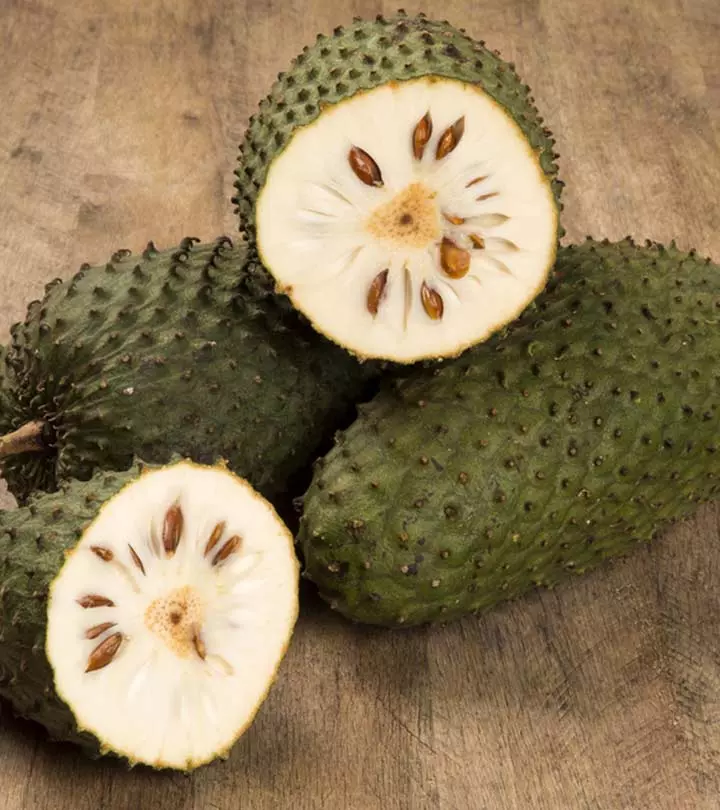

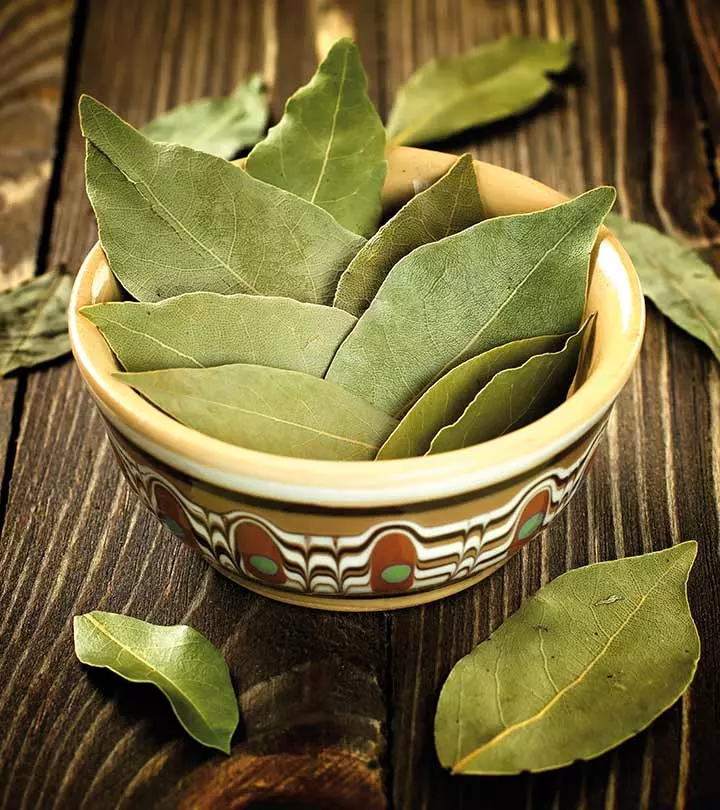

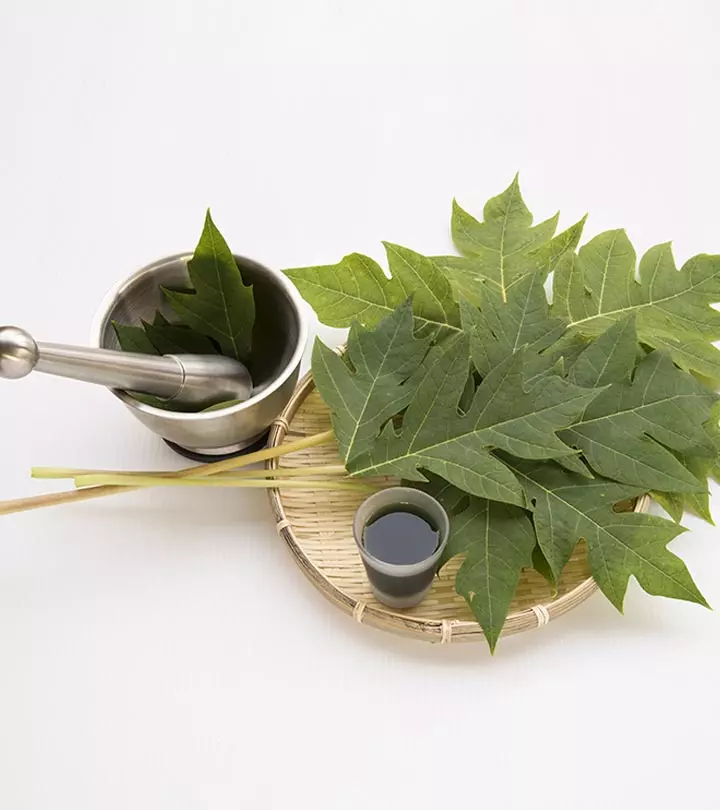
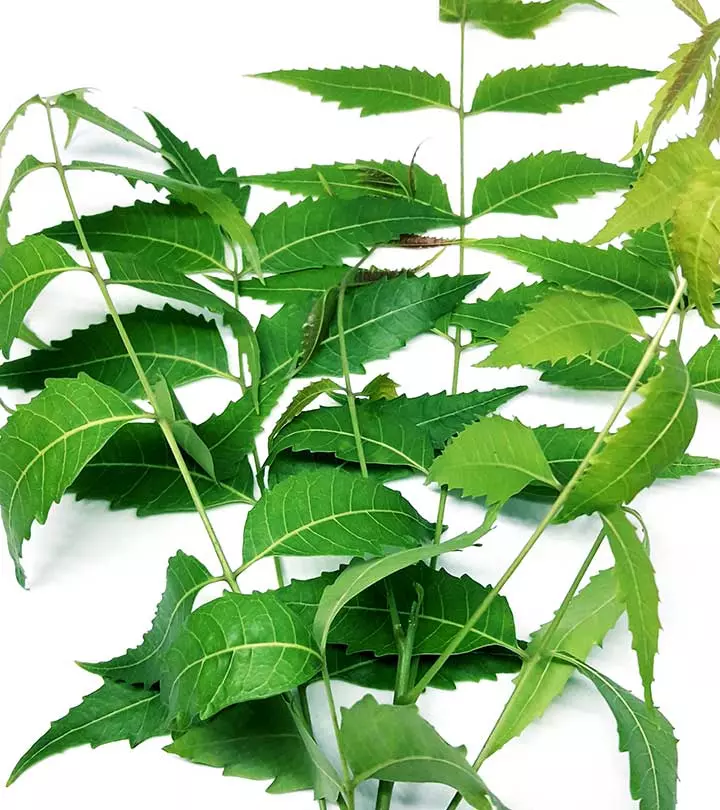
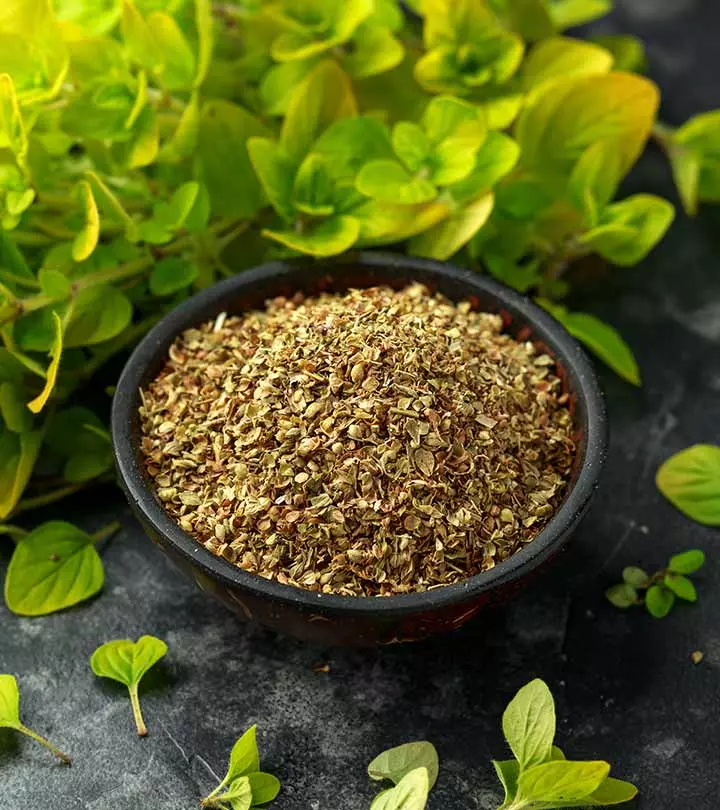


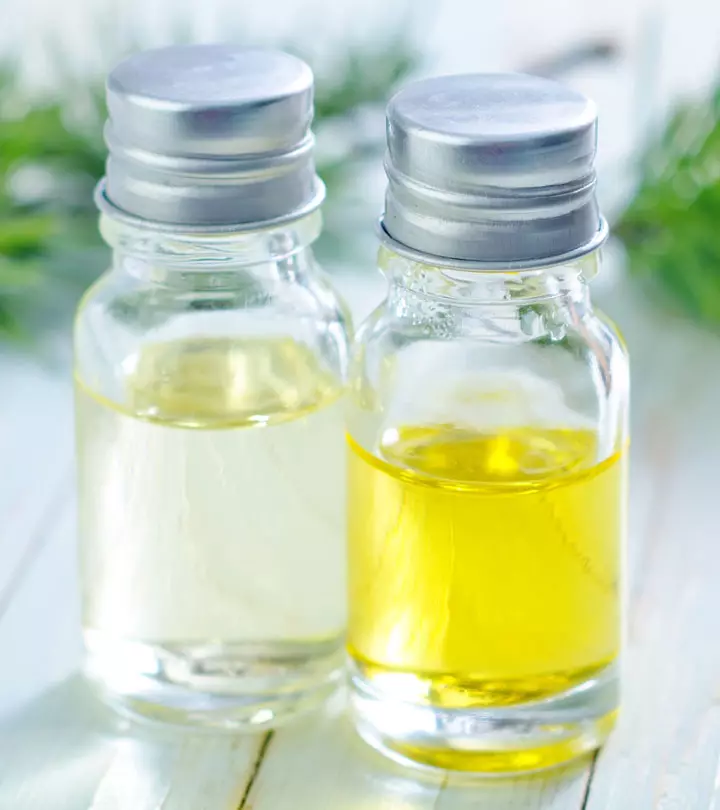
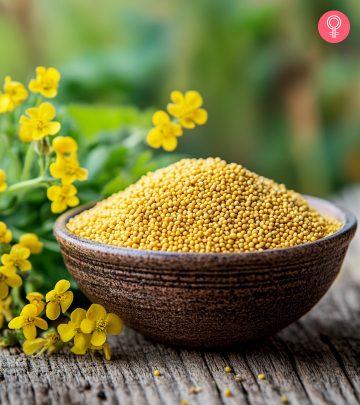




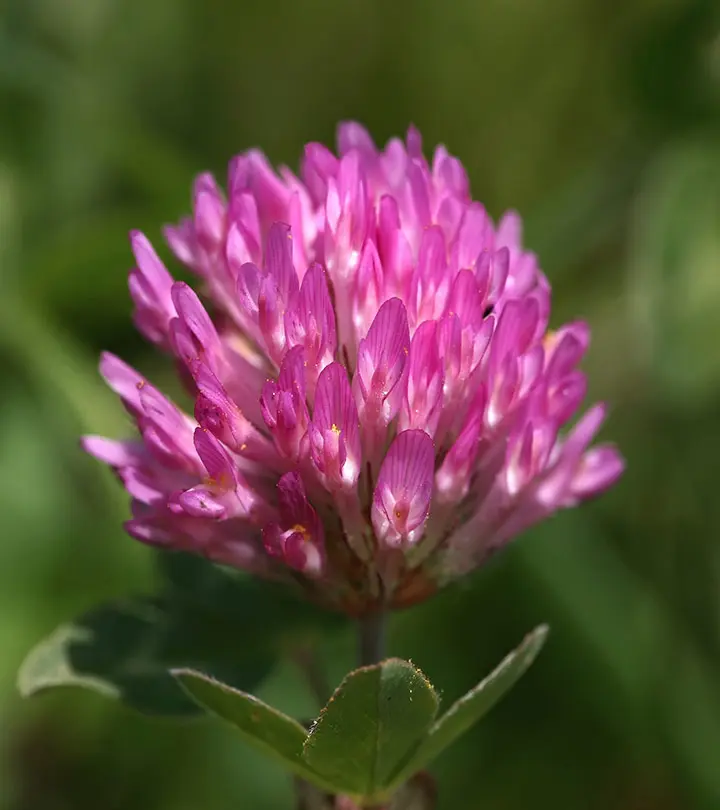
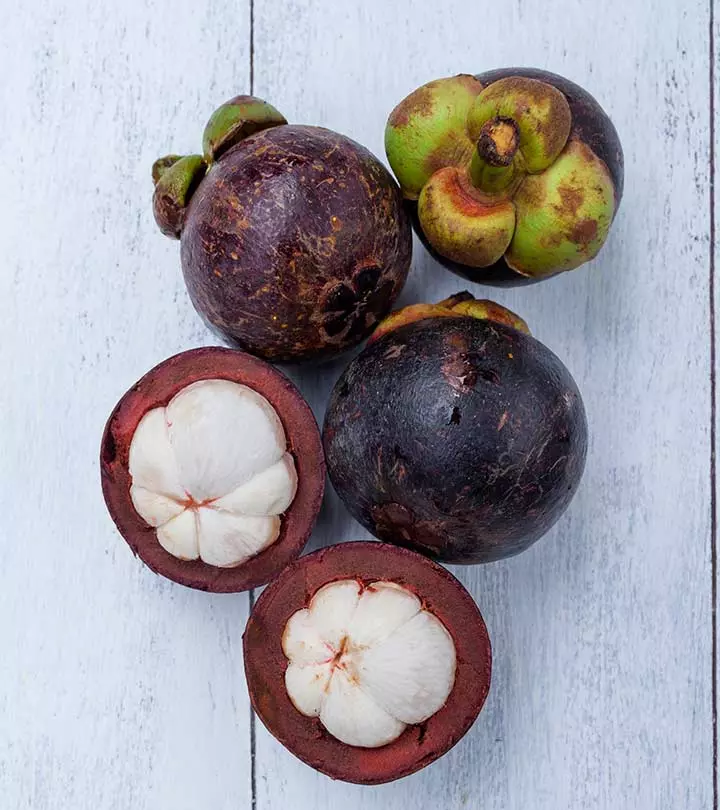
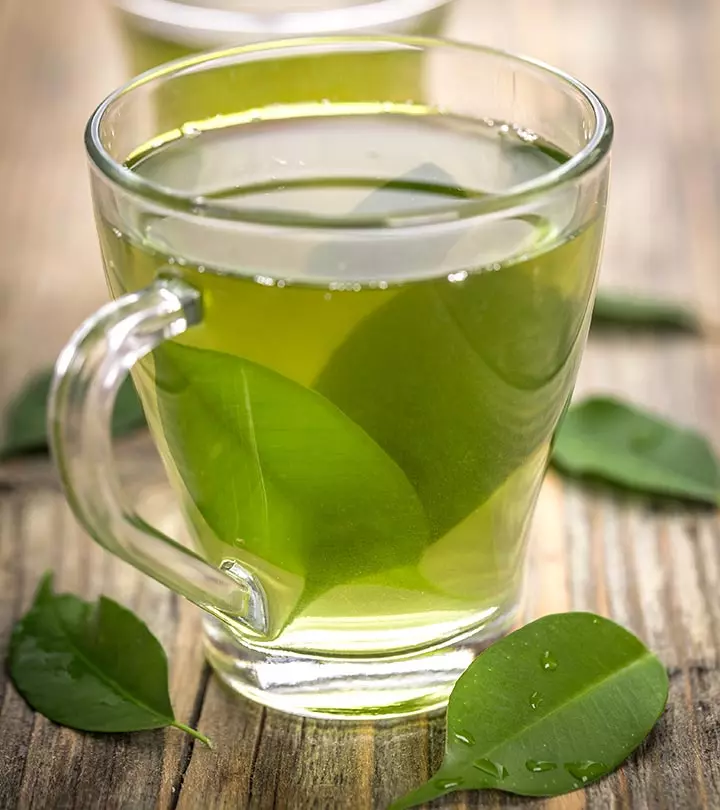

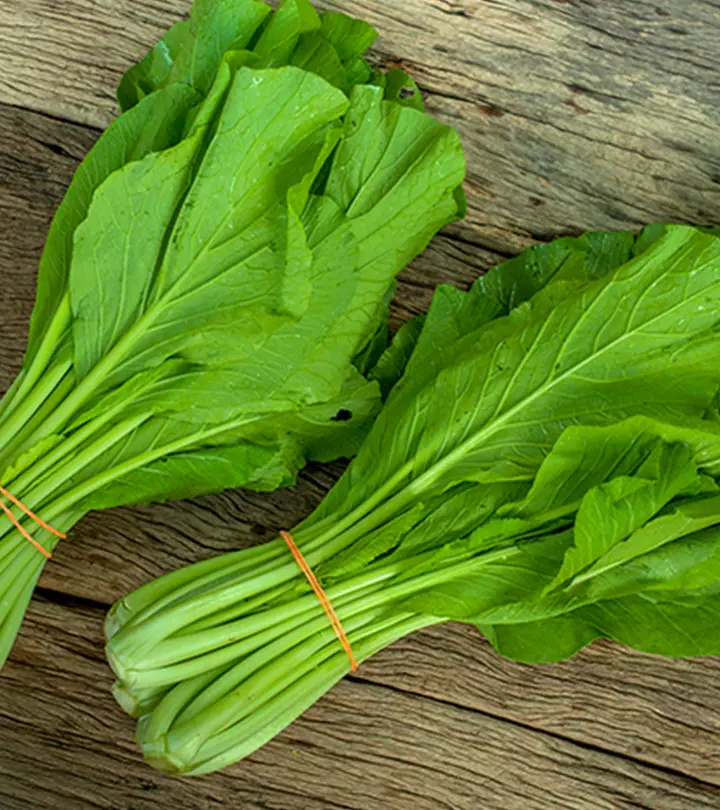
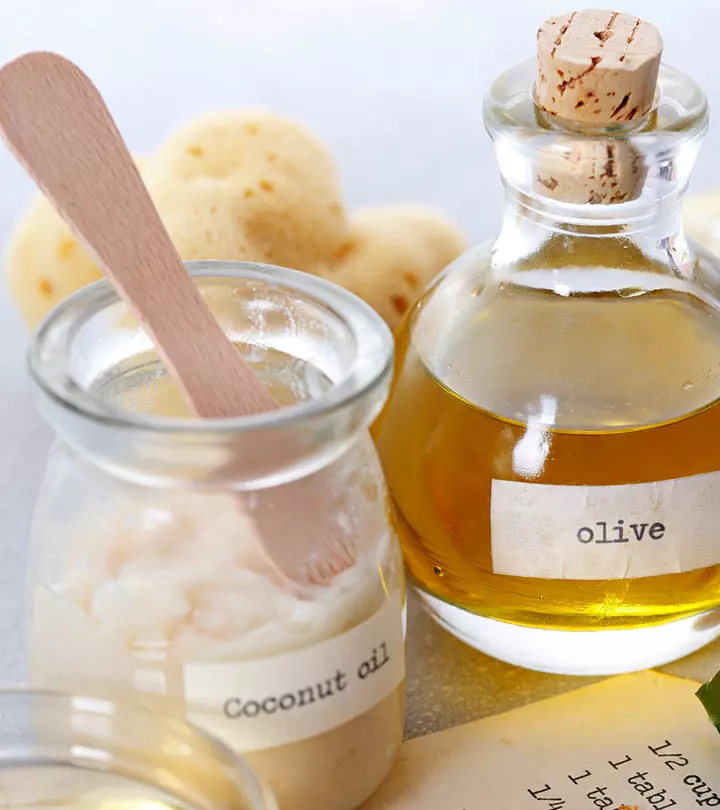
Community Experiences
Join the conversation and become a part of our empowering community! Share your stories, experiences, and insights to connect with other beauty, lifestyle, and health enthusiasts.